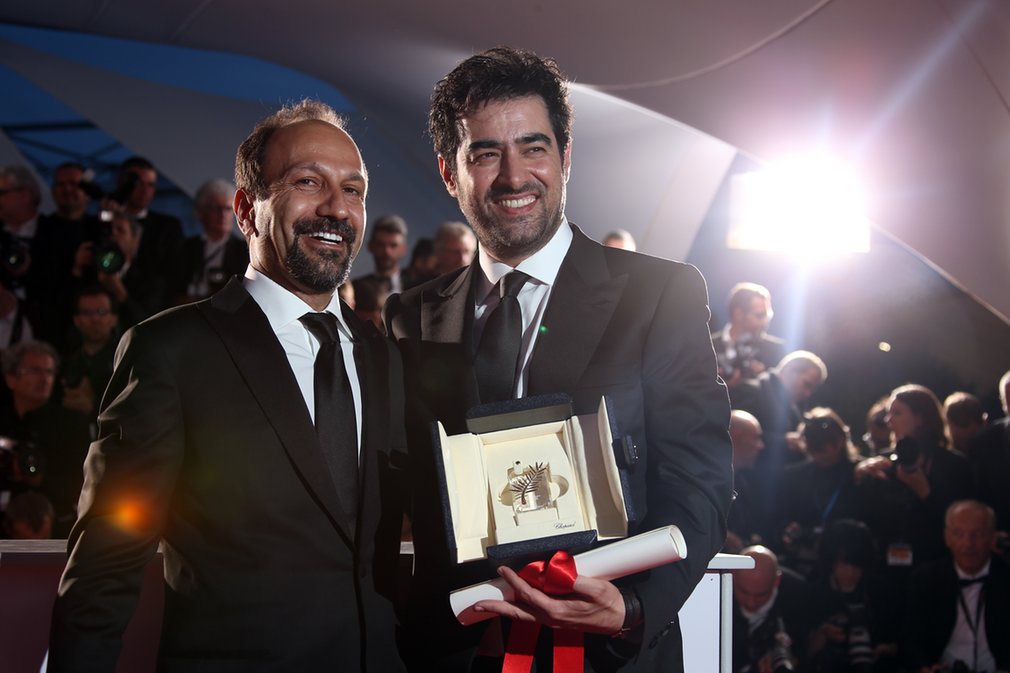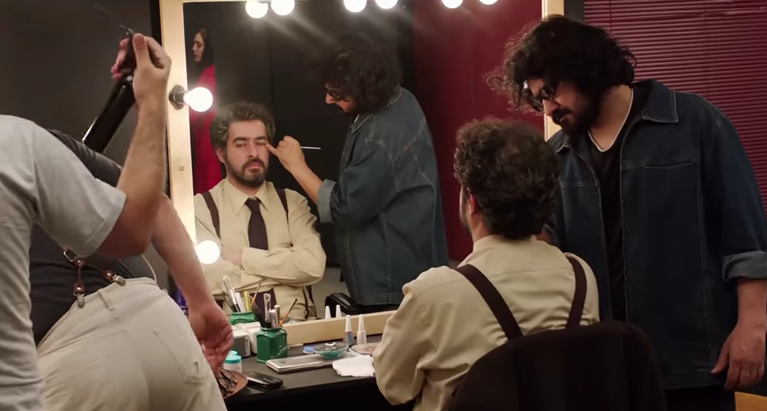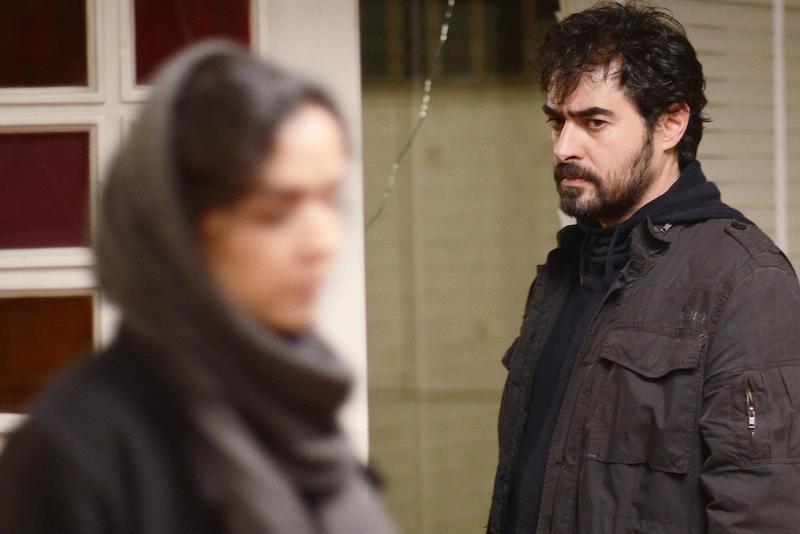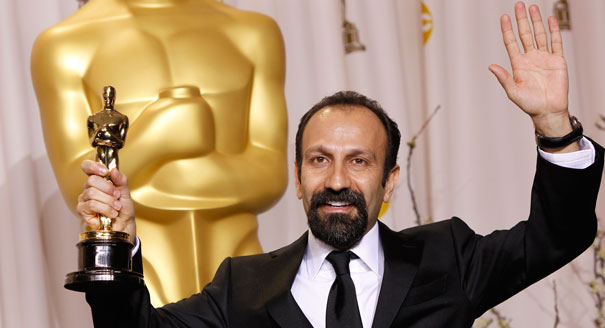Interview: Oscar-Winner Asghar Farhadi Returns with "The Salesman"
 Friday, December 9, 2016 at 7:43PM
Friday, December 9, 2016 at 7:43PM by Nathaniel R
 Two award winners: Asghar Farhadi with his star Shahab Hosseni
Two award winners: Asghar Farhadi with his star Shahab Hosseni
Asghar Farhadi's fame is finally catching up to his talent. After his international breakthrough with A Separation (2011) which won the Oscar and the Globe Globe for Best Foreign Language Film and became a significant arthouse hit internationally, the Iranian auteur has had three other movies travel to cinemas abroad. The acclaimed About Elly (2009) found renewed life and finally a US release, and his two follow up pictures The Past (2013) and The Salesman (2016) both took home coveted acting prizes from Cannes.
The Salesman, which will begin its US release in January after an Oscar-qualifying week recently in Los Angeles, is Farhadi's fourth consecutive film to be chosen by Iran to represent the country at the Academy Awards. Like A Separation, it's a stunner which begins simply before a fraught incident sends out large ripples complicating the story and the characterizations. We talked to Farhadi about the pressure of representing Iran, his Oscar night journey, and his creative process. The interview is after the jump...

NATHANIEL: Let's start with the theater. Your new film The Salesman is about married stage actors. I'm curious about the use of a theater production (The Death of a Salesman) as backdrop? I know you studied theater originally. Did you always want to fuse it with film?
ASGHAR FARHADI: I used to work in theater many years ago and I constantly hoped to return. But given as I was busy in the cinema the opportunity has not arisen. So then I decided to satisfy my enthusiasm for the theater by connecting a story with the theater.
I did not want to do an adaptation of a theatrical play. What I wished to do in a film was to muddy the boundary between theater and film. This reflects me as well, the theater section and the film section are not two separate things within me but dissolved together.
NATHANIEL: Your films are so focused and gripping - you generally start with something that seems simple but it grows super complex. When did you know you had this gift for storytelling?
I can't say exactly when it began and how but even in my first short film at the age of 13, it contained a story. And I'm always htrilled to hear stories. It may go back to my childhood surrounded by adults who were great storytellers. Where my grandfather was concerned - even the most mundane events he would. When I entered the theater and came to understand drama a whole new world opened itself up to me. I came to understand that storytelling, aside from suspense, could contain many other layers as well.
When you're first starting a screenplay, do you start with character studies, or a germ of a story and extrapolate from there?
It never begins with a character. It never begins with a theme or the plot. I never start by saying 'There's this important thing I want to say and so know I have to look for a story for it!' For me it always starts with a spark that leads to a succcinct story. For instance in A Separation the image I began with was a man bathing his elderly father. Little by little I expanded it and it became a story. And the story dictated to me how the characters would be. I am never able to have a character before the story because it's the turbulent circumstances of these stories that reveal the characters. Once I've written ten pages of the story I reread it and I ask myself "What is this story talking about?" Prior to that I don't really know what the subject or theme are. For instance with The Salesman, once I'd written I realized the story was about humiliation and privacy. In the continuation of my writing I strive to create a harmony within the themes.
 Hosseini and Alidoosti lead "The Salesman" beautifully.
Hosseini and Alidoosti lead "The Salesman" beautifully.
You've worked with Shahab Hosseini before in A Separation and Taraneh Alidoosti is in quite a few of your early films. Did you know they would play the married couple in this one while writing? When do the actors come into your process since you have kind of a troupe?
It varies from film to film. With The Salesman I knew who would be playing the two leads while I was writing the summary. With About Elly that's not how it was. I saw several actors after the screenplay was written and tried to decide. But in general terms there's usually one or two parts I know which actors will play them. This helps me a lot in entering the world of the film. On the set I am more comfortable, too, because we know each other's tastes.
You've received a lot of praise and an Oscar nomination for your writing. But your movies visuals are also impressive. A lot of key images in The Salesman come without dialogue: the crack in the building, the images of the empty stage, actors in makeup. Do you storyboard?
Up to now I've never worked with storyboards. I worry that it will confine me on the set, make me feel less free. A great number of these images come to exist during the writing process. Since I write my screenplays myself I'm also already thinking of the directing. For instance the series of images at the beginning were in the screenplay. But other images comes to be during the shooting, like the final scene in The Salesman. And there are times where the visual moments that happen during the shooting acquire a great importance in the film. As an example that final scene in About Elly when they're trying to lift the wreck out of the water at the beach. I think that's the greatest shot I've ever managed to get.
It sounds like the process is very organic for you. But has anything changed for your since the international success of A Separation?
In a direct way it did not creat a change of any kind. I make films the same way I use to. But it's possible that in an indirect way it has affected me. I make every effort when I go to make a film to approach it as though it was the first film I was making. I experience the same degree of anxiety and stress as with my first film. But I do realize that it is a truth that every film I make now will be compared to my earlier films and A Separation. I don't fight that. I accept it as a reality. I try to follow what path my heart dictates.
This will probably sound silly and very American of me but when I saw A Separation I suddenly saw Iran in a far more complex and three dimensional way -- we tend to get very cartoonish portrayals of other countries in our cinema. Since your audience is now international, are you conscious about the fact that you're providing them a window into your country? Does that feel like a lot of pressure?
That does exist but I don't see it as a pressure but as an opportunity. I recognize that no one film could in any way claim to provide a picture of a whole society, a society of over 70 million that have a variety of beliefs and lives. But each film can provide a picture of a small segment of that society. But even that that's a relative picture from my point of view! But for as long as it doesn't limit my abilities as a filmmaker I'm going to take advantage of this opportunity to provide a window into my country.

What's your most vivid memory of attending the Oscars for A Separation?
What struck me most powerfully and is still very vivid is my relationship with the other candidates that were up for the same Oscar. When they called my name, all of them stood up as well and shook hands. Although we were in competition in the course of that time period we became good friends. It's a rare thing when people are competing for them to have this kind of relationship. This was an image that held a great deal of significance for me. Countries who perhaps have had political issues with each other but their filmmakers were standing side by side and sharing their energy.

Foreign Film Contender Reviews
Death in Sarajevo - Bosnia & Herzegovina | Neruda - Chile | Mother - Estonia | Elle - France | Toni Erdmann - Germany | The Salesman - Iran | Chevalier - Greece | Sand Storm - Israel | Fire at Sea - Italy | Desierto - Mexico | A Flickering Truth - New Zealand | Apprentice - Singapore | Age of Shadows - South Korea | Julieta - Spain | My Life as a Courgette - Switzerland | Under the Shadow - UK | From Afar - Venezuela



Reader Comments (7)
A great look into his process; thanks for this.
The Salesman is a great film. Love that we're continuing to see such interesting work from him.
Loved the questions and answers about his process. Thank you for this!
It's not the first time that I read a foreign film Oscar winner talking about the fellowship that goes on during those days with the rest of the nominees. It makes sense. It's not their party.
I believe he's directing a movie with Penélope and Bardem. Those two need a good one.
I struggled with the Salesman, the relationship felt oddly cold and distant and I just didn't buy into it which is the opposite of how I felt about the three previous movies of his that I watched.
Peggy -- we briefly discussed that but it was too vague for me to include. He wants to do a movie in Spain but he had a lot of "ONLY IF" in the statement.
Thanks for this Nat. Great interview!